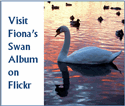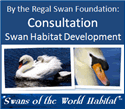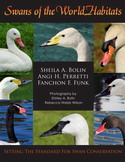Ask the Swan Specialist
Date: 23 March 2016
Hi:
The only methods to stop reproduction is to separate the sexes, (which is not going to work in an area such as public park/body of water) or remove/addle the eggs. When removing the eggs or disturbing the nest in any manner, the female will lay more eggs. This results in a major health problem to the female as she loses up to 30% of her energy level each time she produces eggs and nests. If she double clutches, she could become extremely stressed and even die from the stress of laying extra eggs, especially in the heat of Florida. So, not a good idea as floating dead swan bodies in public view will definitely cause a public uproar.
You state that in your opinion, based upon the number of non-survivors, that reproduction must be reduced. However, what scientific basis/measurements do you have to base this assumption? In open captive settings (no fencing/or other enclosures), birds and wildlife will lose young due to lack of survivability (genetics), predation (all young, captive or wild will succumb to predation. In Florida, you have native species: owls, hawks, turtles, alligators, herons, egrets, etc., that will attack and kill the young), flooding, drought, disease and injury.
Even in the best kept captive settings, natural attrition will occur. If young are stressed due to heat, etc., they can become ill and even die. If they get into areas that have chemicals, i.e., insecticides, fertilizers, etc., their small size and weight can be affected even if a small amount of the chemical is ingested whereas a larger/older bird may not be affected.
If lack of care is the issue, then this presents a whole new area of not only unethical inhumane care, but also legal issues. Any public or private entity is required by state law to provide humane care, timely and necessary veterinary care, supplemental food, nesting material and any other related necessities required to maintain an exotic species in a safe and adequate habitat. (There are no native swans in Florida, so all swan species fall under this exotic species)
How big is the body of water and how many swans inhabit the area? The size of the pond, resources (nesting/food) and size and age of the flock are the first points that must be addressed before even considering controlling reproduction. If the flock is an older flock, you risk losing some swans to age related attrition such as disease, injury and other natural causes.
If you stop reproduction and a major catastrophe occurs which wipes out most of the flock and the public finds out that you were controlling and limiting the numbers based upon no sound measures, a public nightmare can occur.
Since we do not know the size of your pond/lake, we will provide you with some generalizations. ˝-1 acre of water/habitat (2-4 swans). 8 -20 acres water/habitat (up to 100 swans) 30-50 acres water/habitat (up to 200 swans) over 50 acres water/habitat (200+ swans). Again, this depends also on the support provided in a captive setting. Does your body of water and the size of your flock fit into any of these categories?
We have been involved with many public and private facilities where swans are used to augment a pond or lake. Swans, especially the Mute Swans are a sentinel/indicator species alerting to problems with the environment such as the presence of heavy metals and harmful microorganisms. So, if the swans are producing and some of the young are surviving, this would indicate that the habitat is adequate and healthy. Again, since we are not in your area on a daily basis, we do not know what kind of care is being rendered and if lack of care is the issue rather than the reproductive numbers.
In our experience, state and local parks/ponds are funded through taxpayer funding. This funding is set aside to care for the habitat and any wildlife in the area. If this is not the case and the taxpayers find out about this lack of care, problems can arise. Legal constraints by the state could be imposed. We have direct knowledge of many public ponds with swans in which politicians or care takers did not properly care for the swans and other wildlife. The ensuing public backlash resulted in politicians voted out of office, people (caretakers) losing their jobs, fines posted against the entity requiring that the habitat be brought up to standards and public input required in the care of the swans and other wildlife prior to any control or management of species.
People do not like wildlife killed, controlled or inhumanely managed. Taxpayers do not like their taxpayer dollars used to sell or give away wildlife which they are funding and which they enjoy having on their taxpayer funded parks and lakes.
Documentation should and has to legally be maintained to list all current members and any new members hatched and surviving, veterinary care, date of yearly exams, finding of those exams and any veterinary care rendered due throughout the year.
If this documentation is not being kept, this is a violation under state wildlife laws. So, if this documentation is showing that numbers are stable and the members are still alive from year to year and producing to some extent, this would further validate that the flock and offspring are healthy and no need for any human intervention.
Finally, we strongly suggest that you do not get another Trumpeter Swan if you are having trouble. The Trumpeter just like other swan species is experiencing a raised hormone level during nesting season. Without a mate, this hormone level will return to normal levels more quickly than having a mate and producing cygnets. If the swan is allowed to produce, the testosterone levels will take longer to level off and he will become much more defensive with cygnets. Again, you may need a breeder’s license and a federal permit for Trumpeter cygnets and under these regulations, you will not be able to give away or sell the cygnets. This will cause more Trumpeters inhabiting the pond and increased problems.
Additionally, the Trumpeter Swan cannot be separated or placed in an enclosure if this is a large pond as he must be allowed to freely live and co-habit on this pond. Otherwise, federal and state wildlife care violations may come into play since he is a protected species (and we assume that the park has a federal permit) so the permit is based upon an adequate setting.
Should something happen to the Trumpeter swan, (stolen, killed, dies from disease or other issue), it must be reported to federal and state wildlife authorities immediately and this going to cause an investigation. So, if anyone is entertaining the idea of separating or removing the Trumpeter swan, this may cause some major headaches to the park based upon state and federal wildlife laws. He needs to be left alone and the utmost care be provided to him under federal wildlife regulations. His testosterone level will return to normal levels. You certainly cannot give him away as this would also violate federal regulations. We hope that this information is of benefit. The Regal Swan
Messages In This Thread
- Control of swan reproduction rate -- Shall remain nameless -- 23 March 2016
- Re: Control of swan reproduction rate -- The Regal Swan -- 23 March 2016
Ask the Swan Specialist is powered by
Tetra-WebBBS 5.30 Beta © 2006-2007 Tetra-Team






